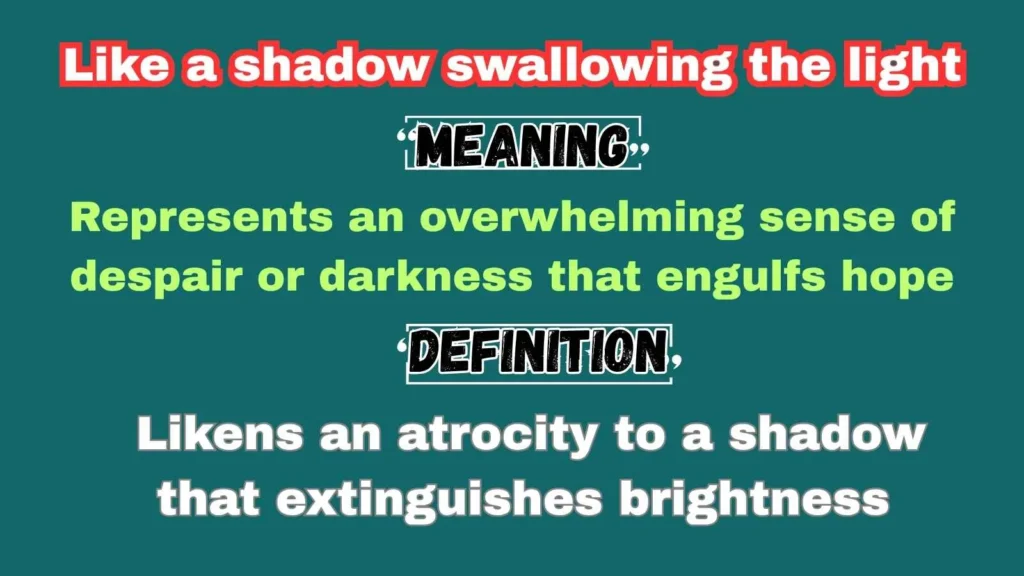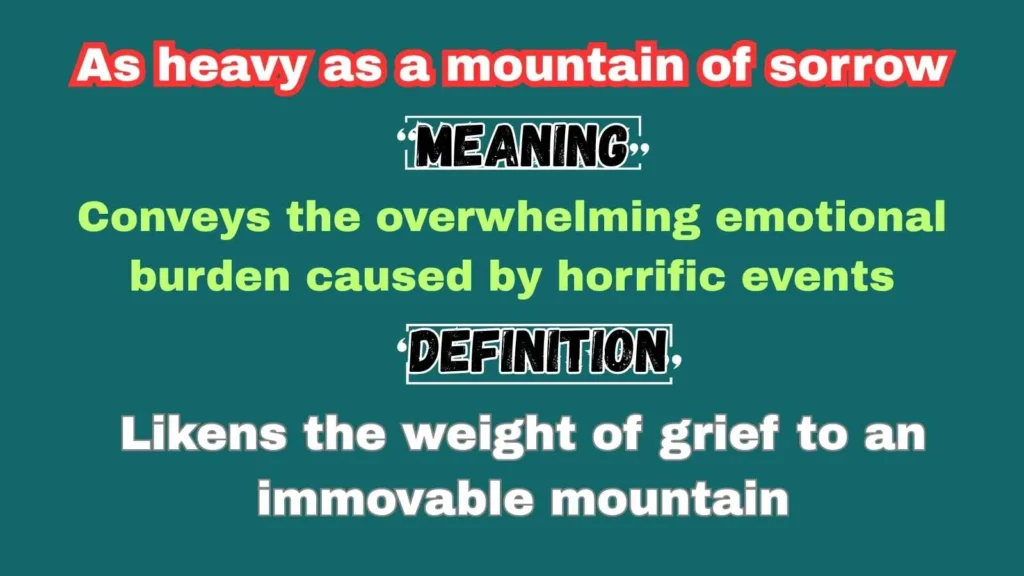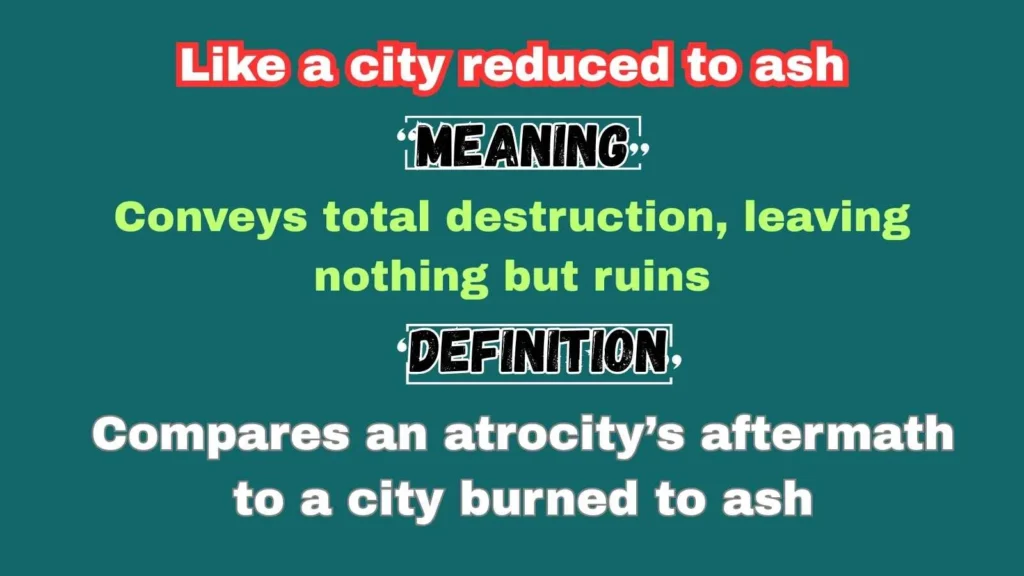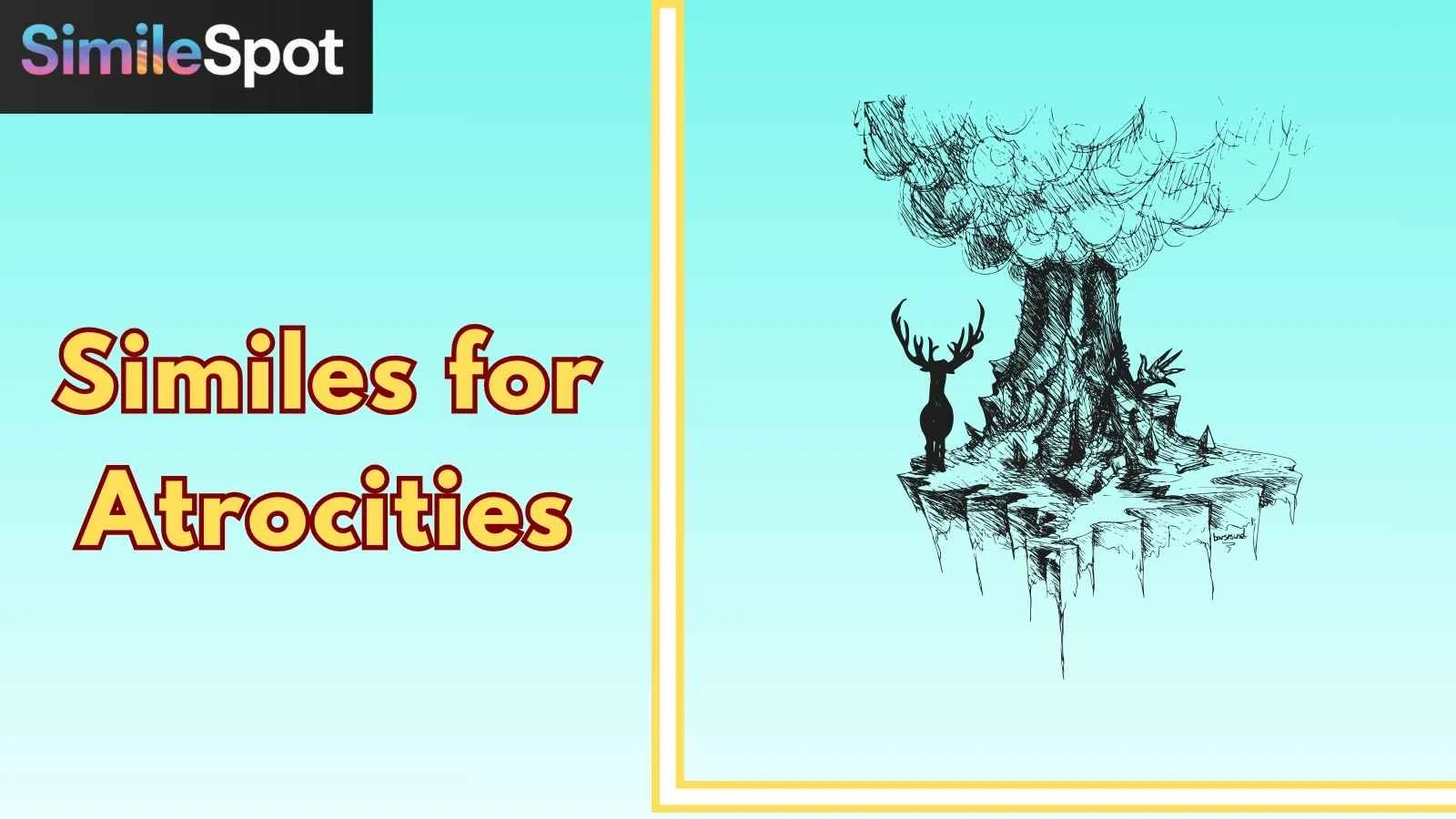Similes paint vivid pictures by comparing one thing to another using “like” or “as,” making complex emotions or events easier to grasp. Describing atrocities—horrific acts that scar humanity—through similes can evoke deep feelings and create lasting images in readers’ minds.
This topic is compelling because it blends creativity with raw emotion, helping writers convey the weight of such events. Whether you’re crafting a poem, story, or essay, these comparisons will spark your imagination and resonate with your audience.
Read on to explore a curated list of similes that capture the gravity of atrocities, complete with meanings and examples to inspire your work.
Quick Definition of a Simile
A simile is a figure of speech that compares two different things using “like” or “as” to create a vivid image or emphasize a quality. It simplifies complex ideas, making them relatable and impactful.
Table of 5 Quick Similes
| Simile | Meaning | Example Sentence |
|---|---|---|
| As cruel as a storm tearing through a village | Describes relentless destruction | The war swept through the town, as cruel as a storm tearing through a village. |
| Like a shadow swallowing the light | Represents overwhelming despair | Grief fell over the survivors, like a shadow swallowing the light. |
| As cold as a winter grave | Conveys emotional or physical harshness | His orders were as cold as a winter grave, ignoring the cries for mercy. |
| Like a fire consuming a forest | Suggests rapid, uncontrollable devastation | The conflict spread, like a fire consuming a forest, leaving nothing behind. |
| As heavy as a mountain of sorrow | Emphasizes unbearable emotional weight | The loss felt as heavy as a mountain of sorrow, crushing their spirits. |
As cruel as a storm tearing through a village
Meaning: This simile portrays an atrocity’s relentless and chaotic destruction, leaving devastation in its wake.
Definition: Compares a brutal act to a violent storm’s unstoppable force.
Examples:
- The invasion was as cruel as a storm tearing through a village, destroying homes and lives.
- Her words cut deep, as cruel as a storm tearing through a village, leaving silence.
Like a shadow swallowing the light

Meaning: Represents an overwhelming sense of despair or darkness that engulfs hope.
Definition: Likens an atrocity to a shadow that extinguishes brightness.
Examples:
- The tragedy fell over the community, like a shadow swallowing the light.
- His actions cast a gloom, like a shadow swallowing the light of joy.
As cold as a winter grave
Meaning: Highlights the chilling, emotionless nature of an act or person.
Definition: Equates an atrocity’s harshness to the bleakness of a frozen grave.
Examples:
- The dictator’s decree was as cold as a winter grave, sparing no one.
- Her indifference to suffering felt as cold as a winter grave.
Like a fire consuming a forest
Meaning: Suggests rapid, uncontrollable destruction that leaves nothing untouched.
Definition: Compares an atrocity to a wildfire’s relentless spread.
Examples:
- The riot spread like a fire consuming a forest, destroying everything in its path.
- Hatred grew like a fire consuming a forest, burning all trust.
As heavy as a mountain of sorrow

Meaning: Conveys the overwhelming emotional burden caused by horrific events.
Definition: Likens the weight of grief to an immovable mountain.
Examples:
- The news of the disaster was as heavy as a mountain of sorrow, crushing hope.
- Their loss felt as heavy as a mountain of sorrow, lingering for years.
Like a wound that never heals
Meaning: Describes lasting pain or trauma that persists over time.
Definition: Compares an atrocity’s impact to an unhealing wound.
Examples:
- The memory of that day was like a wound that never heals, always aching.
- Her grief remained, like a wound that never heals, raw and painful.
As dark as a moonless night
Meaning: Evokes a sense of complete hopelessness or evil.
Definition: Equates an atrocity to the absence of light in a pitch-black night.
Examples:
- The act was as dark as a moonless night, devoid of humanity.
- Fear enveloped them, as dark as a moonless night without stars.
Like a river of tears
Meaning: Represents endless grief or suffering caused by an event.
Definition: Compares emotional outpouring to a flowing river.
Examples:
- The tragedy left them in mourning, like a river of tears flowing endlessly.
- Her sorrow poured out, like a river of tears, unstoppable and deep.
As brutal as a predator’s strike
Meaning: Highlights the brutal, merciless nature of an act.
Definition: Likens an atrocity to a predator’s swift, deadly attack.
Examples:
- The attack was as brutal as a predator’s strike, leaving no chance for escape.
- His betrayal felt as brutal as a predator’s strike, sudden and vicious.
Like a city reduced to ash

Meaning: Conveys total destruction, leaving nothing but ruins.
Definition: Compares an atrocity’s aftermath to a city burned to ash.
Examples:
- The war left the region like a city reduced to ash, barren and broken.
- Their dreams crumbled, like a city reduced to ash, with nothing left.
As silent as a forsaken grave
Meaning: Describes eerie, haunting stillness after a tragedy.
Definition: Equates the aftermath to the quiet of an abandoned grave.
Examples:
- The village stood as silent as a forsaken grave after the massacre.
- Her heart grew as silent as a forsaken grave, numb to the world.
Like a storm cloud bursting with rage
Meaning: Suggests sudden, explosive anger or violence.
Definition: Compares an atrocity to a cloud unleashing a torrent of fury.
Examples:
- The mob descended like a storm cloud bursting with rage, unstoppable.
- His outburst was like a storm cloud bursting with rage, terrifying all.
As sharp as a blade’s edge
Meaning: Emphasizes the piercing, precise cruelty of an act.
Definition: Likens an atrocity to the cutting precision of a blade.
Examples:
- The betrayal was as sharp as a blade’s edge, cutting through trust.
- Her words struck as sharp as a blade’s edge, wounding deeply.
Like a scream in the void
Meaning: Conveys futile cries or suffering ignored by the world.
Definition: Compares an atrocity’s pleas to a scream lost in emptiness.
Examples:
- Their cries were like a scream in the void, unheard by the world.
- The injustice felt like a scream in the void, echoing without response.
As relentless as a tidal wave
Meaning: Describes unstoppable, overwhelming force.
Definition: Equates an atrocity to a tidal wave’s destructive power.
Examples:
- The violence swept through, as relentless as a tidal wave, sparing none.
- Grief hit her as relentless as a tidal wave, drowning her spirit.
Like a heart torn in two
Meaning: Represents deep emotional pain or division.
Definition: Compares an atrocity’s impact to a heart ripped apart.
Examples:
- The loss left them like a heart torn in two, broken and raw.
- Her family’s rift was like a heart torn in two, irreparable.
As bleak as a barren wasteland
Meaning: Evokes desolation and hopelessness after a tragedy.
Definition: Likens an atrocity’s aftermath to a lifeless wasteland.
Examples:
- The town lay as bleak as a barren wasteland, empty and ruined.
- Hope faded, as bleak as a barren wasteland, with no relief in sight.
Like a poison spreading through veins
Meaning: Suggests slow, insidious harm that corrupts everything.
Definition: Compares an atrocity to poison’s creeping destruction.
Examples:
- Hatred spread like a poison through veins, tainting the community.
- Fear grew like a poison through veins, weakening their resolve.
As fierce as a lion’s roar
Meaning: Highlights intense, terrifying aggression.
Definition: Equates an atrocity to a lion’s powerful, fearsome roar.
Examples:
- The attack came as fierce as a lion’s roar, shaking the ground.
- His anger was as fierce as a lion’s roar, intimidating everyone.
Like a dream turned to dust
Meaning: Conveys the loss of hope or aspirations due to tragedy.
Definition: Compares an atrocity’s impact to a dream crumbling away.
Examples:
- Their future was like a dream turned to dust, shattered by war.
- Her ambitions faded like a dream turned to dust, lost forever.
As hollow as an empty shell
Meaning: Describes emotional or physical emptiness after an event.
Definition: Likens an atrocity’s aftermath to a lifeless shell.
Examples:
- The survivors felt as hollow as an empty shell, drained of life.
- His words rang as hollow as an empty shell, lacking sincerity.
Like a vulture circling its prey
Meaning: Suggests predatory, opportunistic cruelty.
Definition: Compares an atrocity to a vulture’s menacing presence.
Examples:
- The oppressors waited like a vulture circling its prey, ready to strike.
- Greed hovered like a vulture circling its prey, exploiting the weak.
As jagged as broken glass
Meaning: Emphasizes the painful, fragmented nature of an act.
Definition: Equates an atrocity to the sharp edges of shattered glass.
Examples:
- The betrayal cut as jagged as broken glass, leaving deep scars.
- Their lives broke apart, as jagged as broken glass, impossible to mend.
Like a sky without stars
Meaning: Conveys a loss of hope or guidance.
Definition: Compares an atrocity’s impact to a starless, dark sky.
Examples:
- The tragedy left them like a sky without stars, lost and hopeless.
- Her future seemed like a sky without stars, empty of dreams.
As suffocating as a thick fog
Meaning: Describes overwhelming, oppressive suffering.
Definition: Likens an atrocity to a dense, inescapable fog.
Examples:
- Fear settled over them, as suffocating as a thick fog, blinding hope.
- The oppression was as suffocating as a thick fog, choking freedom.
Like a flame devouring hope
Meaning: Suggests the rapid destruction of optimism or joy.
Definition: Compares an atrocity to a fire consuming hope.
Examples:
- The news hit like a flame devouring hope, leaving only despair.
- Their spirit burned out, like a flame devouring hope, gone too soon.
As piercing as a siren’s wail
Meaning: Highlights the sharp, alarming impact of an event.
Definition: Equates an atrocity to a siren’s urgent cry.
Examples:
- The scream was as piercing as a siren’s wail, chilling the crowd.
- Her grief felt as piercing as a siren’s wail, impossible to ignore.
Like a chain binding the soul
Meaning: Represents oppressive, inescapable suffering.
Definition: Compares an atrocity to chains that trap the spirit.
Examples:
- The injustice was like a chain binding the soul, crushing freedom.
- His guilt felt like a chain binding the soul, heavy and tight.
As raw as an open wound
Meaning: Conveys intense, unhealed pain or trauma.
Definition: Likens an atrocity’s impact to a fresh, painful wound.
Examples:
- The memory was as raw as an open wound, still bleeding years later.
- Her sorrow felt as raw as an open wound, tender to the touch.
Like a storm shattering dreams
Meaning: Describes the destructive force that ruins aspirations.
Definition: Compares an atrocity to a storm destroying dreams.
Examples:
- The war came like a storm shattering dreams, leaving only ruins.
- Their hope broke like a storm shattering dreams, scattered and lost.
Crafting Vivid Narratives with Similes
Similes can transform your writing, adding depth and emotion to poems, stories, songs, and essays. Here’s how to use them effectively:
- Poetry: Use similes to create vivid imagery. For example, “like a shadow swallowing the light” can evoke despair in a poem about loss.
- Stories: Enhance character emotions or settings. Describe a war-torn village “as bleak as a barren wasteland” to set a somber tone.
- Songs: Pair similes with rhythm for emotional impact. “Like a river of tears” can resonate in a ballad about grief.
- Essays: Use similes to clarify complex ideas. Comparing injustice to “a chain binding the soul” can make arguments more relatable.
- Tips: Choose similes that match your tone, avoid overuse to maintain impact, and tailor them to your audience for maximum resonance.
FAQs
What is a simile in simple terms?
A simile compares two things using “like” or “as” to create a vivid image.
Why use similes to describe atrocities?
Similes make the emotional weight of atrocities more relatable and impactful for readers.
Can similes be used in all types of writing?
Yes, similes enhance imagery in poetry, stories, essays, and songs when used thoughtfully.
How do I create my own similes for atrocities?
Think of a strong image (e.g., a storm or wound) and pair it with the emotion or impact of the atrocity.
Are similes effective in serious topics like atrocities?
Absolutely, they convey complex emotions clearly, making serious topics more accessible.
Conclusion
Similes offer a powerful way to express the profound impact of atrocities, turning raw emotions into vivid, relatable images. Writers can use these comparisons to craft compelling narratives that resonate deeply with readers.
Whether in poetry, prose, or song, these similes breathe life into your words, sparking empathy and understanding. Embrace them to elevate your writing and connect with your audience on a deeper level.

I’m a writer at SimileSpot who loves turning ideas into simple and creative similes. My goal is to help readers understand comparisons easily and enjoy learning through clear, fun examples. I believe similes make language more alive and meaningful.

